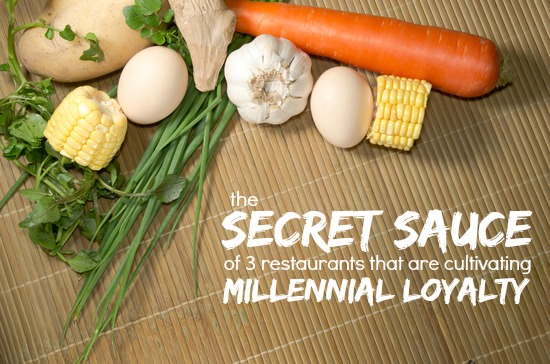“Millennials are driving a disruption in the food industry…I think we’ll see the food industry turned on its head,” says Lifeway Foods' CEO, Julie Smolyansky. Millennials desire for transparency has caused a $18 million dollar market share lost among the top 25 food and beverage companies in the last 5 years. If today’s restaurants want to win over the 50% of Millennials who refer to themselves as “foodies,” they will need to note what these three restaurants are doing to cultivate Millennial loyalty.
Taco Bell embraces digital, purpose, transparency, and booze.
Taco Bell connects with the mobile generation through their Live Más mobile app that allows users to select a local store, customize an order, and pay via Visa’s Checkout simple payment process. Taco Bell recently launched the ta.co website, where visitors can place orders, calculate how many calories their order will have, and score original branded content.
Taco Bell donates 100% of all net profits from the sale of merchandise to the Taco Bell Foundation, which aims to eradicate the high school dropout crisis and helps teens recognize their potential. This appeals to the Millennial's preference for brands with a purpose.
Taco Bell plans to embrace the Millennial transparency movement by having touchscreen kiosks inside of their restaurants where customers can order, pay, and watch their order being made on a monitor.
Lastly, Taco Bell announced a new concept, Taco Bell Cantina, where beer, wine, sangria, and “twisted Freezes” will be sold.
Related Read: 3 Companies With Strong Strategies When It Comes To Attracting And Retaining Millennials
Chipotle cultivates unique experiences and reinforces transparency.
Chipotle holds three “Cultivate” festivals a year around the U.S. The musical acts and food is a huge draw for the festival-loving Millennial generation. In fact, 55% of Millennials say they’re spending more on events than ever before. And after attending a food or beverage festival, 99% of Millennials say they recommend the winery, brewery, restaurant or food purveyor afterward.
As for transparency, Chipotle recently launched a “Friend of Faux” campaign where users can win food prizes by taking an online quiz to identify Chipotle’s 68 ingredients against competitor’s much less natural sounding ingredients.
Millennial allegiance to Chipotle shows no signs of slowing.
Related Read: How Shake Shack Is Winning The Better Burger Revolution By Attracting Millennial Employees and Customers
ShopHouse leverages food with integrity.
ShopHouse is Chipotle’s long, long, long lost cousin. ShopHouse brings Chipotle’s service format and food philosophy to the vibrant culinary tradition of Southeast Asia. ShopHouse coordinates their food supply with Chipotle’s to reduce waste and food miles, and they buy organically grown produce whenever practical.
ShopHouse offers food that is entirely gluten-, wheat-, and dairy-free and a selection of Responsibly Raised meats free of antibiotics and growth hormones.
Millennial’s preference for high-quality, natural food, and a transparent food assembly line model will surely spur the growth of ShopHouse.
Question: How else are restaurants catering to Millennials?
Consider Ryan Jenkins to be your next Millennial/Generation Y or Generation Z keynote speaker by clicking here...
![]()






